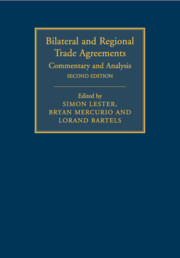Book contents
- Frontmatter
- Contents
- List of contributors
- Foreword
- Table of Cases
- Table of treaties and international agreements
- List of abbreviations
- Part I Introduction
- Part II Economics and politics of PTAs
- Part III Relationship with WTO and international law
- Part IV Legal aspects of PTAs: A comparative analysis
- 8 Agriculture
- 9 Regional trade agreements and trade in services
- 10 Investment
- 11 Government procurement
- 12 Intellectual property
- 13 Social issues: Labour, environment and human rights
- 14 Dispute settlement
- Index
10 - Investment
from Part IV - Legal aspects of PTAs: A comparative analysis
Published online by Cambridge University Press: 05 October 2015
- Frontmatter
- Contents
- List of contributors
- Foreword
- Table of Cases
- Table of treaties and international agreements
- List of abbreviations
- Part I Introduction
- Part II Economics and politics of PTAs
- Part III Relationship with WTO and international law
- Part IV Legal aspects of PTAs: A comparative analysis
- 8 Agriculture
- 9 Regional trade agreements and trade in services
- 10 Investment
- 11 Government procurement
- 12 Intellectual property
- 13 Social issues: Labour, environment and human rights
- 14 Dispute settlement
- Index
Summary
I. Introduction
This chapter provides an analysis of the investment commitments in Bilateral and Regional Free Trade Agreement (FTA) investment chapters.
Part II commences with an examination of the history of treaty-based legal protections for foreign investment. This Part traces the evolution of investment provisions, from Treaties of Friendship, Navigation and Commerce (FNC), through to Bilateral Investment Treaties (BITs), and their most recent incorporation into investment chapters in Free Trade Agreements (FTAs).
Part III discusses the scope of investment provisions and analyses how the different definition of phrases such as ‘investor’ and ‘investment’ determines the scope of FTA Investment Chapters. This Part therefore inquires into whom the investment chapter applies to, and what will constitute an investment for the purpose of the chapter.
Part IV continues the analysis of States’ commitments in the FTA Investment Chapter, but with a focus on their substantive commitments.
Part V focuses on investor-state dispute settlement (ISDS) provisions in FTA Investment Chapters and outlines the main elements and differences between the ISDS provisions in different FTA Investment Chapters. It also explains how these ISDS provisions use, and rely on, the United Nations Commission on International Trade Law (UNCITRAL) Arbitration Rules and the International Centre for Settlement of Investment Disputes (ICSID) Convention, Regulations and Rules (‘ICSID Convention’).
Part VI outlines the market access provisions in various FTA Investment Chapters, with a focus on whether States schedule their market access commitments in the form of either a positive or negative list. This Part looks at the differences between positive and negative lists, and considers the argument for and against each approach.
Finally, Part VII discusses the main issues likely to arise under FTA Investment Chapters and considers the implications of the proliferation of FTAs with investment chapters for progress on investment at the WTO.
II.International investment law – from FCNs to FTAs
Investment provisions in international agreements have a long history. During the seventeenth and eighteenth centuries, a combination of capital and expertise led to significant foreign investment from United States (US) and European investors in large infrastructure projects such as railroads and telegraph systems in areas such as Latin America. However, the perceived national interest character of these investments also caused host States, from time to time, to expropriate these investments, thereby highlighting to investors the need for mechanisms to protect their overseas investments.
- Type
- Chapter
- Information
- Bilateral and Regional Trade AgreementsCommentary and Analysis, pp. 245 - 298Publisher: Cambridge University PressPrint publication year: 2016
- 2
- Cited by



